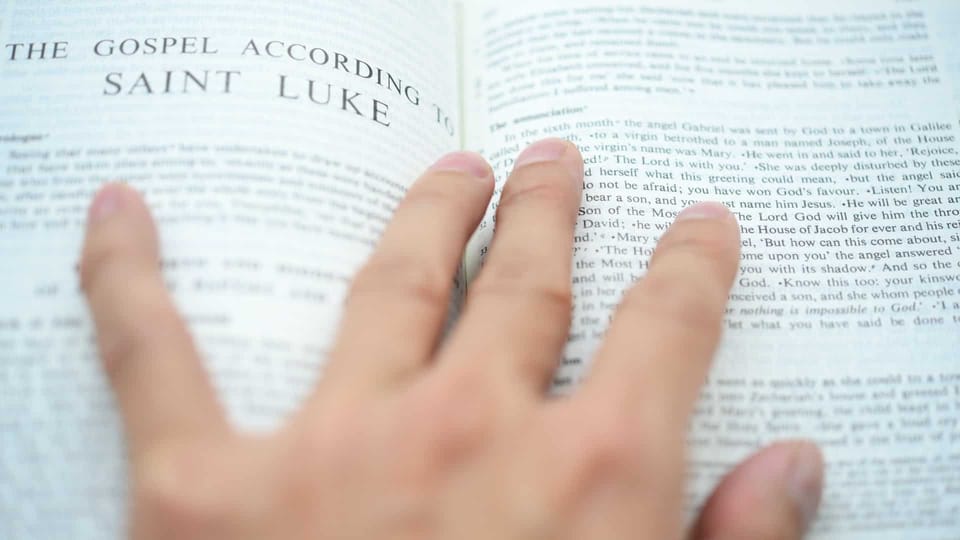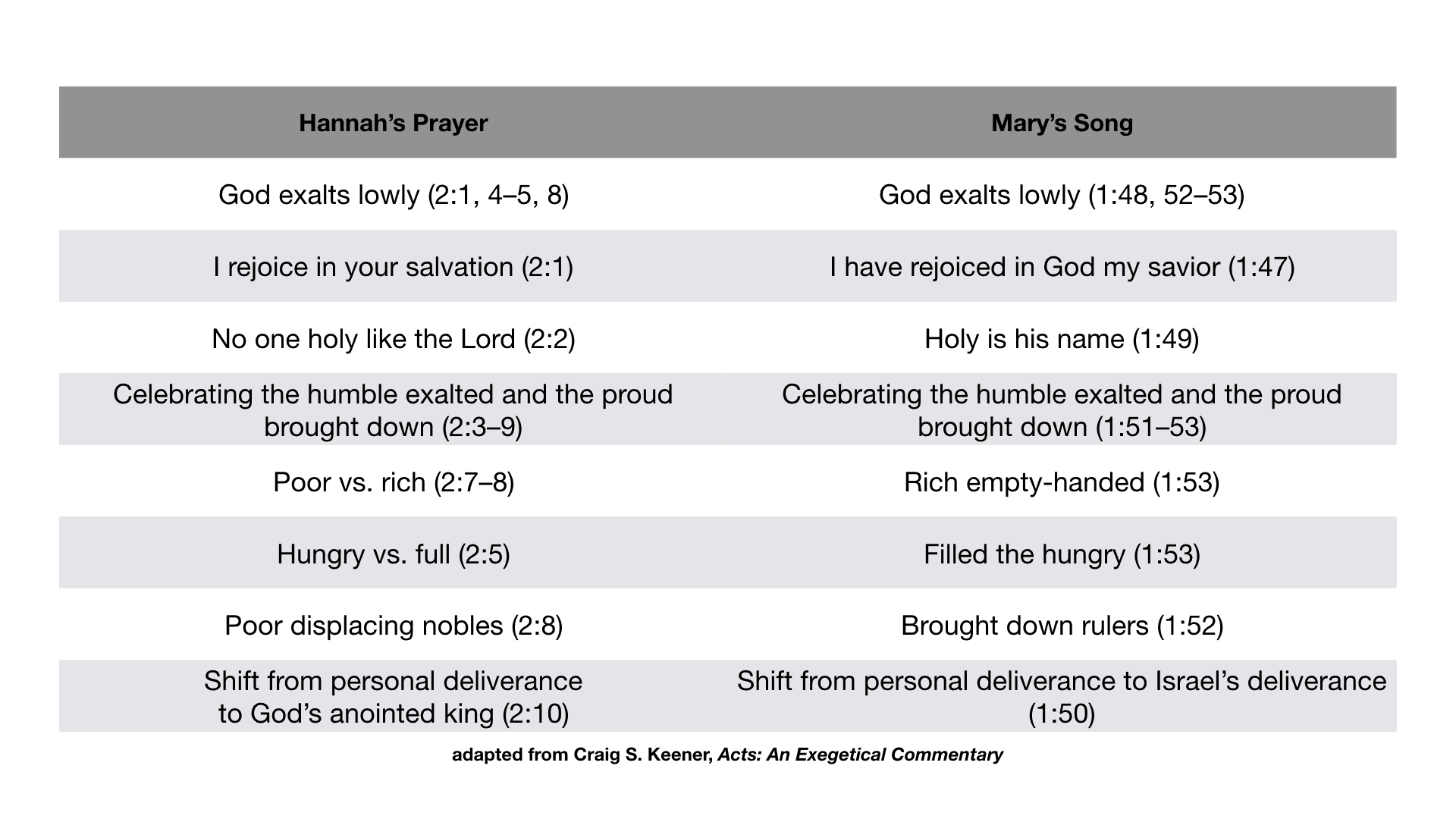Reversal (Luke 1:46-56)

Big Idea: Jesus’ birth reminds us that God cares for the insignificant. The lowly matter to God.
We all ask the question sometimes: does God really care?
Let’s face it. You are one small person. Ray Dalio writes:
Each one of us is only one of about seven billion of our species alive today and that our species is only one of about ten million species on our planet. Earth is just one of about 100 billion planets in our galaxy, which is just one of about two trillion galaxies in the universe. And our lifetimes are only about 1/3,000 of humanity’s existence, which itself is only 1/20,000 of the Earth’s existence. In other words, we are unbelievably tiny and short-lived and no matter what we accomplish, our impact will be insignificant. At the same time, we instinctually want to matter…
Do you matter? Does God really care? Mathematically, it seems the answer would be no. You are less than a rounding error. In the same way that nobody cares when you accidentally step on an ant, it would seem that God couldn’t possibly care about you and your problems or even your life.
That’s the conclusion I would come to. It’s logical. I think it makes a lot of sense.
But then the Bible comes along and completely contradicts what I say.
In the book of 1 Samuel, we’re introduced to an insignificant woman named Hannah. She was facing an annual celebration, and she’d had enough. She was childless. Her husband had two wives, and it was even more upsetting for Hannah because the other wife had children. It’s not hard to imagine how she must have felt. Things were even harder at this celebration because when it came time to eat, we read that “her rival used to provoke her grievously to irritate her” (1 Samuel 1:6). You know what that’s like: some of us know what it’s like to be provoked at annual Christmas gatherings. Those closest to us know our sore points.
And so Hannah had enough. We read, “Therefore Hannah wept and would not eat” (1 Samuel 1:7). Picture that this week. Everyone’s gathered. It’s time for the festive meal. But Hannah is so upset that she can’t even participate or even eat. She went to the temple and prayed. We read, “She was deeply distressed and prayed to the LORD and wept bitterly” (1 Samuel 1:10). She asked God for a son. There’s nothing that she wanted more.
Again, ask yourself: could God really care about this solitary woman? As someone has said, “She addresses Yahweh of hosts, cosmic ruler, sovereign of every and all power, and assumes that the broken heart of a relatively obscure woman in the hill country of Ephraim matters to him” (Dale Ralph Davis). But is that a safe assumption? Can we really presume that the Lord of hosts cares about us?
We don’t have to guess at the answer. We read a few verses later:
And Elkanah knew Hannah his wife, and the LORD remembered her. And in due time Hannah conceived and bore a son, and she called his name Samuel, for she said, “I have asked for him from the LORD.” (1 Samuel 1:19-20)
Hannah is so overjoyed that she composes a prayer of thanks to God. It begins like this:
My heart exults in the LORD;
my horn is exalted in the LORD.
My mouth derides my enemies,
because I rejoice in your salvation…
(1 Samuel 2:1)
We don’t have time to look at all of it. I wish we did. But I can tell you the major points of her prayer:
- God opposes the proud and exalts the humble
- Despite human evil, God is at work
- God will raise up a Messianic King
It’s quite a remarkable prayer. There’s enough to chew on in that prayer.
But let me summarize what I think it means for us. Does God really care about me? Does my life really matter to him? Yes, because God reverses the ordinary order of things and exalts the humble. God really cares, and the lower you are, the more important it is that you realize that.
Let me pause here and make sure you hear this. Does God really care about your life? With all the billions of people who live, and with all the problems that are on his plate — airstrikes in Syria, fires in Australia, extreme poverty in major parts of the world — does God really care for you? Are you too insignificant for God? The story of Hannah answers in no uncertain terms: you matter. God cares. There’s nobody too humble to be insignificant to God. You are not a rounding error. God cares for you.
Mary’s Reversal
Fast forward hundreds of years and you have a bit of a different story. You meet an insignificant woman in a small town in the hills of an out-of-the-way region called Galilee. There we meet an unmarried woman. She’s engaged to be married. An angel appears to her, tells her that she is going to have a son. She’s supposed to name him Jesus, which in Hebrew means “The LORD saves.” His Kingdom, she’s told, will last forever.
Mary is confused because she’s a virgin. So the angel tells her that the Holy Spirit — the same Spirit who created life in Genesis — will bring life to this child within her.
“Mary goes from some backwoods, no-name girl to the future mother of the King” (The Bible Project). And she sings a song saying that this birth is part of a greater reversal to come.
Look at how she begins:
My soul magnifies the Lord,
and my spirit rejoices in God my Savior,
for he has looked on the humble estate of his servant.
(Luke 1:46–48)
Ring any bells?
Mary quotes a lot of Scripture in her song. There are so many hyperlinks back to Old Testament Scripture: to Psalm 34, Psalm 113, Isaiah 41, and more. But there’s one major hyperlink that jumps out. Mary echoes, in large part, Hannah’s prayer.

The whole song is a giant hyperlink to Hannah’s prayer with all of the same themes.
One of the major themes we’re supposed to get is reversal. It’s the same theme that we see in Hannah’s prayer.
- “He has looked on the humble estate of his servant” (Luke 1:48). Mary did not belong to the ruling class. She was one of “the little people, of modest circumstances.” She had no power. But God has looked upon her, and what he has done for her he does for all of his people. Insignificant people are significant to God.
- “He has brought down the mighty from their thrones and exalted those of humble estate. He has filled the hungry with good things, and the rich he has sent away empty” (Luke 1:52-53). Mighty rulers were in control, but God uses them like pawns to accomplish his purposes. Meanwhile, nobodies get exalted in God’s kingdom. Centuries later we remember the powerful world leaders of that day only for how they fit into the Christmas story, and we remember this insignificant young mother from Nazareth.
Here’s the thing. The writers of Scripture are very skilled at using stories to set up the themes of their books.
- The writer of 1 Samuel places the story of Hannah very carefully at the beginning of 1 and 2 Samuel to introduce us to the theme of the books, about God exalting the lowly, the unknown, to accomplish his purposes in the middle of this evil world.
- And Luke places this song among other songs in the first chapters of Luke to introduce us to a major theme that he’s going to develop in his gospel. “This is what God does for those who are low on the totem pole, and it foreshadows what Jesus will do in his ministry: healing the sick, exorcizing demons from the demonized, reaching out to and restoring the discredited sinners and friendless pariahs, and preaching good news to the poor” (David Garland).
You may be thinking that this is good for Hannah and for Mary, but that they’re different from you. What I love about Mary’s song is that she covers this. She makes it clear that God’s dealings with her are a template for how God deals with all of his people. Mary does something interesting in verses 51 to 53. She recounts what God will do as if he’s already done it. She’s so convinced of how God operates that she explains that this is how God works from now on:
He has shown strength with his arm;
he has scattered the proud in the thoughts of their hearts;
he has brought down the mighty from their thrones
and exalted those of humble estate;
he has filled the hungry with good things,
and the rich he has sent away empty.
(Luke 1:51–53)
We started with a question at the beginning: Do you matter? Does God really care? Are you too insignificant to matter to God?
The stories of Hannah and Mary answer in no uncertain terms: you matter. God cares. There’s nobody too humble to be insignificant to God. You are not a rounding error. God cares for you.
Two concluding thoughts, and then we’re done.
You may think that you matter. A lot of life is about accumulating wealth and power and status so that we reach the point that we can say, “I count. My life matters.” We spend our entire lives trying to gain significance, and when we do it’s still not enough. There’s nothing we can accomplish that will fill that hole in our hearts.
Hannah and Mary challenge us. What is your problem isn’t that you’re not significant enough? What if your greatest problem is that you aren’t humble enough? What if significance isn’t about building a resume accomplishing great things as much as it’s about getting low before God, finding our identity in him? “God opposes the proud but gives grace to the humble” (James 4:6).
Mary reminds us that the thing that gets in the way of us being filled is the stuff we cling to that gets in the way of clinging to God. Luke’s going to tell us stories of people who miss out on Jesus because they’re too full with other things (Luke 18:18-23), and he’s going to tell us stories of people who were unimportant but found eternal life (Luke 7:36-56).
The gospel comes along and says that the nicest and most decent people, the people with the connections are every bit as lost as the prostitutes and the pimps, and if you are a prostitute or a pimp, and you come to him, you become a prophet, a priest, and a king before him. That’s the gospel. That lifts up the poor, but it pulls down the rich. (Tim Keller)
Maybe the first step in finding satisfaction is to stop trying to be filled with stuff that can’t fill us so that he can fill us with good things. You were made to be filled and satisfied in God. Nothing else matters.
Last thought.
You may wonder if you really matter. To answer that, Mary says, look at Jesus. The lower you are, the less you think you matter to him, the more likely it is that you’re the kind of person he came for.
Are you low? Are you poor? Do you have troubles? Has life beaten you down? Jesus is proof that God cares. Jesus is proof that he will never turn you away. Jesus is proof that you matter to him.
Come to him. Trust him. Trust the one who came to this world to die for your sins. He cares for you today, and he will care for you into eternity.
Father, our soul magnifies the Lord. Our spirits rejoice in God our Savior, for you have looked upon the humble estate of your servants. You have brought down the mighty from their thrones, and exalted those of humble estate. You have filled the hungry with good things, and the rich you have sent away empty.
Thank you for this reminder that in a galaxy of 100 billion planets and a world of seven billion people that you care for us. There’s no better proof of your care than sending your Son to live and die for us. We look to him today, in Jesus’ name. Amen.





